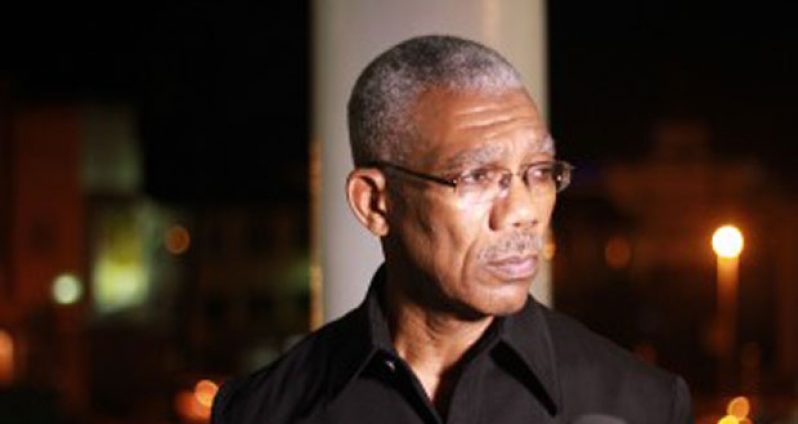THE ball is in the court of President Donald Ramotar and the Private Sector Commission (PSC) should ask the Head of State to come to the Opposition to resolve the problems that have resulted in the current political impasse.
This was the contention of Leader of A Partnership for National Unity (APNU), Brigadier (rtd) David Granger, said at the party’s weekly press conference yesterday.“This letter should be sent directly to the President for him to come to the Opposition and resolve these problems,” Granger said.
PSC’S PROPOSAL
His comments follow the PSC’s proposal of a solution to the political gridlock, which was made public on Thursday.
“It is an interesting initiative by the private sector,” the APNU Leader said.
The PSC has called for an end to the November 10 prorogation of Parliament, as well as the stay of the Alliance for Change (AFC) sponsored no-confidence motion.
The Commission’s call was made in a statement that was made public yesterday, in which several actions were detailed as necessary to move past the current political gridlock that is pushing Guyanese to early elections.
The statement essentially includes three calls:
* An end to the prorogation and stay of the no-confidence motion;
* A one-month period, a moratorium once the prorogation is lifted and the no-confidence motion stayed, which will allow for dialogue before any consideration is given to dissolution of Parliament and subsequent general elections; and
* An agreement that representatives of civil society will be allowed to observe the dialogue process in full once commenced during this period.
DIALOGUE INTENDED
President Ramotar has always maintained that the need for dialogue was uppermost in his mind when he made his decision. Paving the way for greater dialogue among political parties, he contends, would have kept the 10th Parliament alive to address critically important issues currently before the National Assembly.
The effect of ending the first session of the 10th Parliament via prorogation is the termination of the business of the National Assembly.
As a result the AFC’s no-confidence motion was not considered. Also APNU had, prior to November 10, signalled its intent to support the push through of the motion.
Had it not been for the proclamation to prorogue Parliament, if the no-confidence motion was passed, Guyana would have been headed to early general elections within three months.
Since the prorogation, APNU and the AFC have made it clear that they will not engage the President in talks unless the prorogation is lifted and Parliamentary work resumes. The rejection of talks was also formally communicated by APNU Leader, Brigadier (rtd) David Granger in a December 2 letter responding to the President’s November 18 invitation for talks.
The most recent contention of the current Administration, following these positions, is that the prorogation objectives, primarily dialogue, have been lost.
ON THE PRESIDENT’S TABLE
However, Granger yesterday insisted that everything that the PSC wrote about is on the President’s table.
“My first reaction, that is to say, my reaction before I consulted my colleagues, was that the main points raised by the private sector commission were exhaustively dealt with in meetings with the president during this year,” he said.
On that note, he laid blame at the door of the current Administration for the failed dialogue.
“Although I am sympathetic, by the initiative of the Private Sector Commission, all of these issues have been covered exhaustively by the president and he has been preventing resolution,” Granger said.
The APNU leader was also asked about the fact that the President prorogued Parliament because his Administration was facing the Alliance for Change (AFC) sponsored no-confidence motion at a time when several critically important matters were engaging the National Assembly’s attention.
He said, “I expressed support for the AFC’s no-confidence motion, and we cannot withdraw it because we did not propose it.”
WE DID NOT COME WITH MAX POSITIONS
President Ramotar’s positions of these recurring contentions were expressed at his last press briefing.
There he made it clear that in every instance of talks with the Opposition, the Government has come to the table with its positions and has reduced those to minimum positions, making concessions; whereas the combined Opposition parliamentary parties have held on to their maximum positions.
When asked to respond to the charge from APNU Leader that the Government has not granted any concessions during talks with the two Opposition parties, the President made it clear that this was untrue–a fact supported by clear evidence.
He said: “It is the other way around….it was not me, but the Opposition that has taken these (maximum) positions…the agreements that we have reached, there haven’t been that many, but it’s been we (the current Administration) who have been making the concessions.…these things are public knowledge; these things are known….I have not been hard or holding so strongly to my grounds.”
Given the current political state of affairs, the Government’s attempts at dialogue and the Opposition’s refusal of the most recent invitation to talks, Guyana could very likely be headed for an early general election. The last election was held in November 2011.



.jpg)









